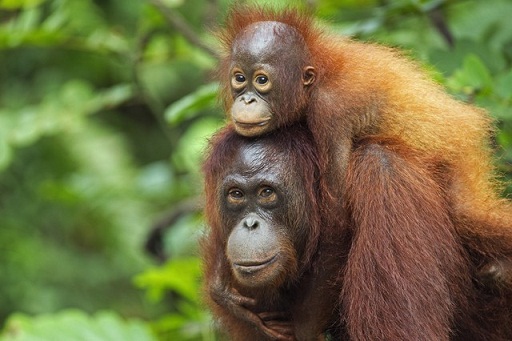On a typical day, veterinarians of International Animal Rescue (IAR) make their way through choking smoke, weighed down with medical supplies, a safety net, animal carrier and face masks. They are called out almost daily to rescue orangutans and other animals trapped by forest fires and attend to their medical needs.

The forest had been burning for five days and the flames were creeping closer. On the brink of collapse, an orangutan desperately tried to protect her baby from the acrid smoke.
Finally, help arrived: nearby villagers had alerted International Animal Rescue Indonesia. The veterinarians tranquilised the two apes sitting in the tree, broke their fall with a net and treated them. “The mother was emaciated and suffering dehydration,” explains IAR coordinator Ayu. The baby was in better shape, and both were soon released into the safety of a nearby forest.
“We’re very worried that the fires won’t stop and that the orangutans will die if we don’t reach them in time,” says veterinarian Karmele Llano-Sanchez. “The fires are also endangering our treatment centre.”
More than a thousand orangutans live in the peat swamp forests of Sungai Putri on Borneo, a location so remote that researchers only documented the population in 2007. This large orangutan colony is described as a glimmer of hope for the survival of the critically endangered primates.
Sungai Putri’s unique forests stand on a peat layer several meters thick – a massive carbon sink. Leaving such peat swamp forests untouched is said to be the best protection against forest fires, carbon emissions and climate change.
In the wake of the disastrous fires of 2015, the Indonesian government outlawed the clearing of peat swamps and other primary forests for plantations.
“Yet that is exactly what a timber company is doing in Sungai Putri. Workers are digging canals to drain the peat – the first step toward replacing priceless orangutan habitat with a pulp plantation,” says Reinhard Behrend of the Rainforest Rescue, which has taken up a campaign to impress it upon the Indonesian government “to stop this crime against the planet”.
Seeking support for the IAR team’s rescue efforts as well as patrols to protect the forests in which the animals are returned to the wild, Behrend adds: “We have been supporting the orangutan guardians of International Animal Rescue in West Kalimantan for many years. The IAR team is called on almost daily to bring injured, helpless or orphaned animals to safety and provide veterinary care at its rescue centre.
“Robbed of their habitat, desperate orangutans often look for food on oil palm plantations. Plantation workers consider them to be a pest, driving the orangutans away or killing them. The remaining orphans are often sold as pets. Besides coordinating helpers who fight fires and work to protect remaining intact forests, IAR also holds workshops for local villagers on how to deal with wandering orangutans – and on the value of our wild cousins who are on the brink of extinction.”
The orangutans are the two exclusively Asian species of extant great apes. Native to Indonesia and Malaysia, orangutans are currently found in only the rainforests of Borneo and Sumatra.
